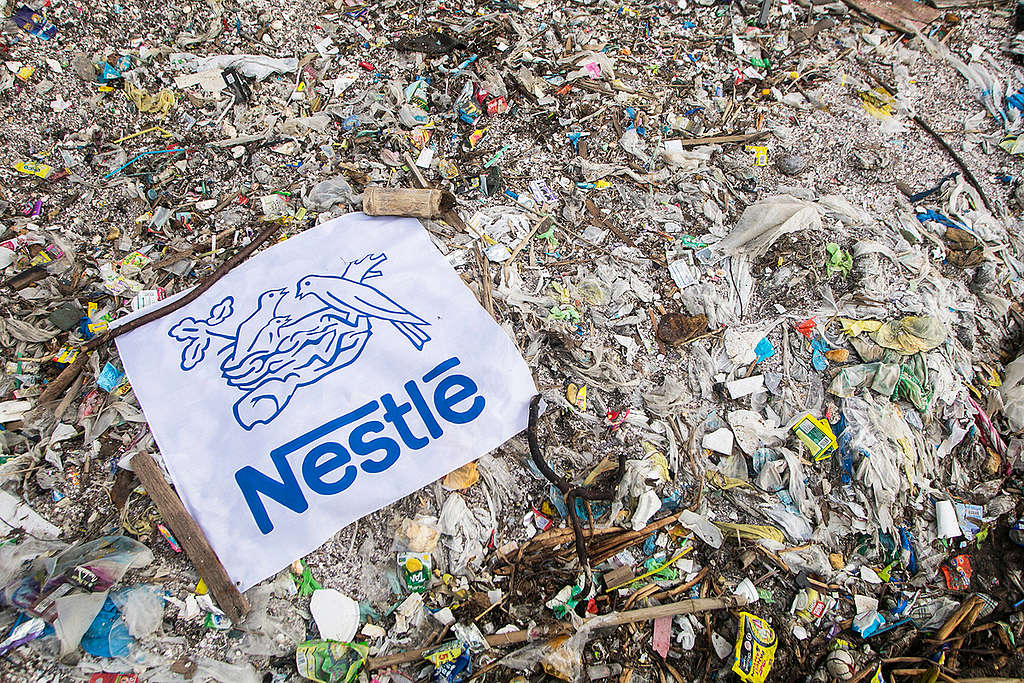QUEZON CITY, Philippines—Environmental organization Greenpeace Philippines warned that the country’s biggest fast-moving consumer goods (FMCGs) companies are delaying the country’s effort to curb the plastics crisis by resorting to interim and hazardous mechanisms instead of heeding calls to phase out single-use plastics.
The statement came following the release of a Philippine Center for Investigative Journalism (PCIJ) report, “Are PH consumer goods companies doing enough to tackle plastic waste? [1]” where companies, such as Unilever and Nestle, admitted that their waste retrieval methods are “interim” and “intermediate.”

PCIJ has found that companies, such as brand and waste audit mainstays Coca-Cola Philippines, Colgate-Palmolive, Monde Nissin, Mondelez Philippines, Nestle Philippines, Procter & Gamble, Unilever Philippines, and Universal Robina Corp., have been settling with waste management mechanisms that are “least preferred” by experts.
These mechanisms include tapping third-party collectors that process plastic waste into construction materials or cement kilns used as alternative fuels, to attain “plastic neutrality” or a scheme that offsets a plastic footprint by investing in waste collection or recycling.
Greenpeace Philippines earlier warned that plastic neutrality is an ugly greenwashing scheme that forces people and communities to shoulder the costs of the impacts of plastic pollution created by companies.
“By relying on waste recovery programs and a co-processing scheme that essentially burns plastic, consumer goods companies like Nestle, Unilever, and Coca-Cola are falling short when it comes to real, systemic solutions—plastic reduction at source and adoption of reuse models,” Greenpeace Campaigner Marian Ledesma said. “Their actions revolve around stopgap mechanisms which, according to PCIJ, barely make an impact. Even longstanding programs like recycling, which companies have often relied on, are ineffective when 91% of the plastic waste collected from the country’s top three polluting brands in 2020 were non-recyclable.”
Ledesma added that plastic neutrality neglects the impacts of plastic throughout its life on people and wildlife. “The entire plastic life cycle—from production to its end-of-life, including recycling and incineration—produces hundreds of millions of metric tons of greenhouse gas emissions, making industrial dependence on plastic a key contributor to the climate crisis.”
Greenpeace also expressed dismay over the companies’ lack of transparency on the amount of plastics they are producing and on the risks of plastic neutrality schemes.
The PCIJ report follows the release of the 2021 Brand Audit Report of the Break Free From Plastic Movement, which shows that Coca-Cola Company, Universal Robina Corporation, Nestlé, Procter & Gamble, and Mondelez International are the top plastic polluters in the country. [2]
Last month, over 50 organizations also called on FMCGs to address the environmental and justice impacts of the plastic pollution [3] by (1) phasing out all single-use plastic packaging and products in their operations; (2) implementing a just transition to affordable and sustainable plastic-free systems, including prioritizing the adoption of reuse and refill systems; and (3) promoting accountability by showing full transparency about their plastic footprint, and the environmental, public health, and climate impact of their packaging.
Greenpeace also calls on Philippine lawmakers to pass a stronger single-use plastic ban that will mandate top plastic-producing companies to take accountability for the plastics crisis.
“Local governments, zero waste advocates, sustainable businesses, and communities are taking on the challenge of plastic pollution with policies and upstream solutions like plastic-free commerce, but billion-peso consumer goods companies have been avoiding necessary changes in their operations. They need to show accountability and take steps to stop polluting the planet.” Ledesma said.
Notes to editors:
[1] Philippine Center for Investigative Journalism (PCIJ) report. Are PH consumer goods companies doing enough to tackle plastic waste?, PCIJ, Oct. 28, 2021
[2] Break Free from Plastic Philippines. (2020). PH Brand Audit Report. https://drive.google.com/file/d/19NUwtc4RH7aK-xz_tJslvj4qYR-IfPo5/view
[3] Joint Statement on Climate and Environmental Justice Impacts of Plastics. https://www.greenpeace.org/philippines/press/11028/joint-statement-on-climate-and-environmental-justice-impacts-of-plastics
[4] Researchers estimate that as of 2015, 42% of primary non-fiber plastic produced worldwide was for packaging. See Geyer et al. (2017) p.2.
Media contact:
Angeli Cantillana
Communications Campaigner, Greenpeace Southeast Asia – Philippines
[email protected] | +63 998 595 9733
